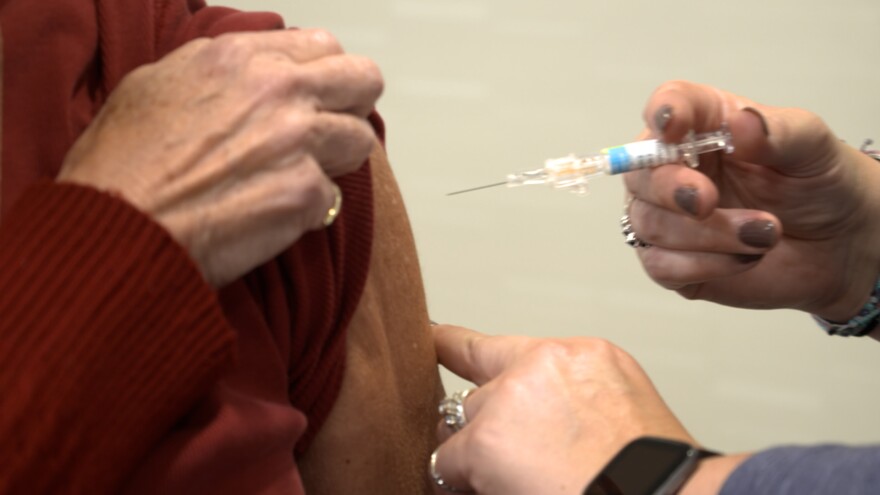- Two new vaccines and a monoclonal antibody therapy are coming to local health providers this fall to help fight RSV
- Respiratory Syncytial Virus often has cold-like symptoms but can be life-threatening to the very young or elderly
- LVHN and St. Luke's will administer the treatments
BETHLEHEM, Pa. — New vaccines and an antibody therapy recently approved by the U.S. Food and Drug Administration will be out this fall to protect the very young and the elderly against a potentially life-threatening respiratory virus.
With the season for Respiratory Syncytial Virus, known as RSV, on the horizon, doctors are preparing to begin administering the shots.
RSV presents as a cold in most children and adults, but it can be dangerous to part of the population.
"More elderly die than children from RSV every year."Dr. Jennifer Janco, Chair of Pediatrics, St. Luke's University Health Network
"More elderly die than children from RSV every year," said Dr. Jennifer Janco, chairman of pediatrics at St. Luke's University Health Network. “It's just as important for our grandparents as it is for our babies."
Janco said a monoclonal antibody therapy, Beyfortus, has been approved for children younger than 8 months or up to 24 months if the child is high-risk.
“It's kind of like a medicine that's given by injection for children to help protect against serious outcomes from RSV disease,” Janco said.
She said the last RSV prevention was developed more than 20 years ago and only offered to high-risk babies.
Different from a vaccine
This new therapy, given through a shot, is different from a vaccine.
"A vaccine is something that is given in many different ways, often times by injection, and it helps the body create antibodies against the disease we're trying to protect from," Janco said.
"With a monoclonal antibody, it is a neutralizing antibody, we're actually injecting that antibody through what's called passive immunization, as opposed to active immunization."
“I want to remind people, it doesn't mean that no one's ever going to get RSV, but we're trying to prevent the most at risk people from getting it at the most adverse times in their life."Dr. Jennifer Janco, chairman of pediatrics at St. Luke's University Health Network
Janco said that when she gives a vaccine, "then I'm giving something where the body actively makes its own antibodies."
She said this treatment has been in studies for years before gaining FDA approval and she feels confident in administering it to her patients.
“I want to remind people, it doesn't mean that no one's ever going to get RSV, but we're trying to prevent the most at-risk people from getting it at the most adverse times in their life," Janco said.
Dr. Sean Heffelfinger, a family practitioner with Lehigh Valley Health Network, said RSV can be severe for certain groups of people.
“Young infants, babies, and especially in the elderly, those with health problems that [RSV] can tend to escalate and cause such things as wheezing, worsening of the cough, trouble breathing," Heffelfinger said.
"Some people require supplemental oxygen for it."
'The goal is to protect the child'
In addition to the monoclonal antibody therapy, two RSV vaccines were approved for older adults and pregnant people earlier this year.
“What's exciting is this is really the first time that there's been a vaccine that's come out for RSV that's going to be available in the fall, both Pfizer and GlaxoSmithKline have developed a vaccine for adults that will be available,” Heffelfinger said.
Heffelfinger often works with the elderly in assisted living, long-term care, and nursing homes. He said those are the patients to whom he will recommend vaccines.
"Of course, the goal is to protect the child, but I think it also helps the health care system in general, so that kids who really need to get in there's better access for all of those things if we're keeping children healthier."Dr. Sean Heffelfinger, a family practitioner with Lehigh Valley Health Network
“The two vaccines that are out for RSV, the one is over 80 percent effective in preventing severe illness from RSV, the other one is over 90 percent effective at preventing severe illness," he said.
"So I mean these are really good, good vaccines with good numbers for preventing severe disease.”
Both physicians said they do not have the treatments yet, but expect them in mid-September or October at both health networks.
Heffelfinger will refer his patients to local pharmacies to get the shot because right now it is covered by Medicare part-D.
"It'll help to empty up some of our hospital beds, or ER beds, our doctors offices, if we can prevent children from getting RSV," Janco said.
"Of course, the goal is to protect the child, but I think it also helps the health care system in general, so that kids who really need to get in there's better access for all of those things if we're keeping children healthier."
She also stressed the importance of people knowing this will help prevent severe illness, not cure RSV.


